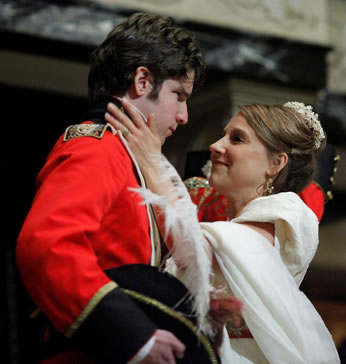All’s Well That Ends Well
In Bertram’s Bliss,
All’s Well That Ends Well
American Shakespeare Center, Blackfriars Playhouse, Staunton, Va.
Sunday, May 16, 2010, E–9&10 (center stalls)
Directed by Jim Warren
Aidan O’Reilly made an admirable effort in his portrayal of Bertram. Unfortunately, Bertram still just was not admirable enough to merit Helena’s devotion.
And that is the problem with this play, which otherwise is one of Shakespeare’s best. It has some profound speeches on the human condition, sublime poetic moments, great lines, and a stage-full of remarkable characters—even the ubiquitous First Lord and Second Lord are as distinctively drawn as are Hotspur and Glendower in Henry IV. It has unique plots and subplots and unusual journeys for the characters: a braggart who comes to a moral ending, a moral lord who embraces humility without injury, a mother who prefers the daughter-in-law to the son, and the son who finally, finally comes to his senses and sees the worth of the wife forced upon him. Even the bed-trick plot works.

Aidan O'Reilly and Ginna Hoben in All's Well That Ends Well at the Blackfriars Playhouse. Photo by Tommy Thompson, American Shakespeare Center.
The only thing lacking is the answer to two simple whys: why does Helena love Bertram to such extremes, and why does Bertram suddenly love Helena after an entire play running from her?
Perhaps this is one of the few Shakespeare plays that reads better than it stages. ASC’s Rough, Rude & Boisterous Tour troupe staged it as well as could be expected without sets. Most of the cast turned in strong performances, highlighted by Rick Blunt’s studied, bombastic sycophant Parolles, Curt Foy’s bitterly bawdy Lavatch, David Zimmerman’s First Lord Domaine with a barely contained zaniness, and James Patrick Nelson’s glibly proud, cynically proper Lafew. Ginna Hoben anchored the play with her Helena, a spirited young lady with deep intelligence, easy wit, and infinite drive. She is the equal to Iago in setting a trap, yet Helena’s motive is grounded in morality and an earnest desire that all come to good. That wish for good she applies even to the braggart, Porolles, who corrupts her love; and that wish for good she especially applies for her love, even after he rudely disses her in the presence of the king.
Which brings us back to the part of Bertram: why does Helena so dote on him, even when he continuously rejects her? Why does she then entrap him? Is it revenge? Then, is Helena no better than Iago. Is she simply smitten? Then she has no more weight than her namesake in Midsummer Night’s Dream. Is she a stalker? Even if she were—and she had the opportunity to aim much higher than Bertram in her reward for curing the king—the key to Helena’s devotion lies in Bertram himself.
On the page, he’s a first-class jerk; he even gets a bad report from the other lords, is easily cast aside by his own mother, and shows the audience his own lack of judgment in taking Parolles as his friend. The key, then, is what’s not on the page. Perhaps he has the looks and charm of Rob Lowe. Perhaps he is the good-looking sports star whose skills (Bertram is an accomplished horse soldier) trump his morals in the eyes of others, one to whom a sycophant can successfully cling, one whom fellow athletes/soldiers choose to embrace even if they don’t like his personality or character. In such a one, Helena would believe she can bring forth redemption given the time and proper circumstances. History (especially sports history—Tiger Woods, even?) is full of such pairings. While few succeed, Hoben’s Helena is a believable exception. O’Reilly, however, did not give us a Rob Lowe, and director Jim Warren did not imbue this Bertram with Tiger Woods' obvious talent.
On the other hand, this production did convincingly establish why Bertram could have such a change of heart at the end. Earlier in the play, right after the bed trick, he listed his night’s activity, adding that “between these main parcels of dispatch [I] effected many nicer needs.” O’Reilly then paused and, absent-mindedly fingering his new ring, remarked in quiet bliss, “the last was the greatest.”
Of course! Great sex! Helena—learned, world-wise, and so inclined to please—would be fantastic in bed. And the moment Bertram realizes it was Helena he made love to that night in Italy, he’s on his knees for a lifetime of such moments.
Eric Minton
May 18, 2010
Comment: e-mail [email protected]
Start a discussion in the Bardroom



 Find additional Shakespeareances
Find additional Shakespeareances